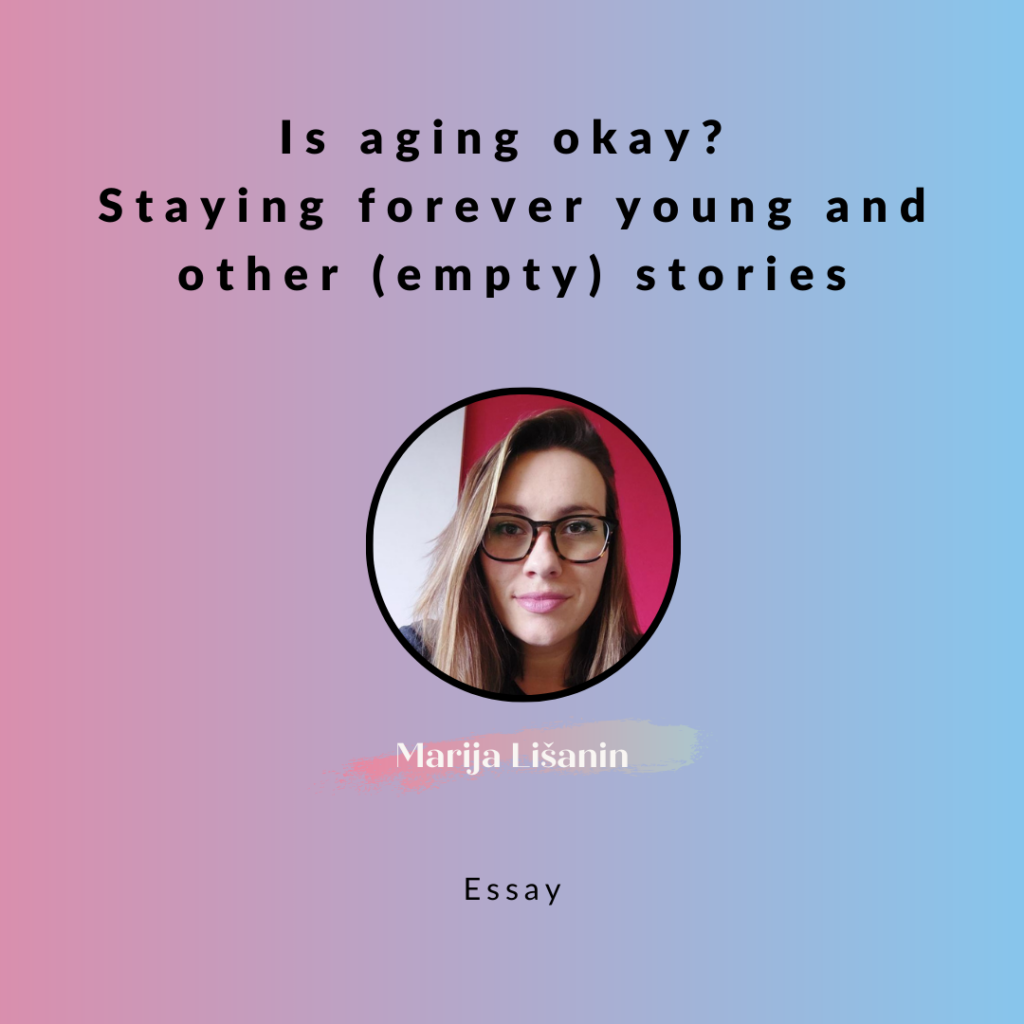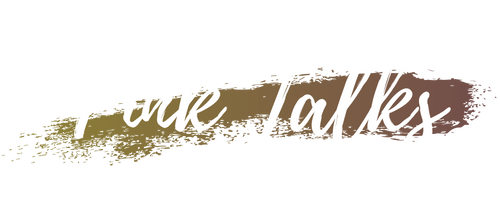
Last year, a friend gave me a cream for the sensitive area wrinkles – around the eyes. Hey, a gift as a sign, what does that tell me? I didn’t use it! I read the composition of the cream and tried to refresh my minimal knowledge of chemistry. Then, I thought to myself and asked, who are we without anti-wrinkle creams, filters, and aesthetic interventions?
I would like to look into people’s backpacks and travel bags to see what they carry with them, what people use to anoint their faces, what they give us as gifts, and why exactly?
Skin care is important, I know! I struggled with acne in my teens, hormonal acne in my twenties, then I got hyperpigmentation and chicken skin. I believe that all this has existed since the beginning of time, but yes, thanks to the Internet, I can find all aesthetic diagnoses. If not there, there will always be someone who will point out my imperfect skin. Is it an aesthetic problem? Am I too androgynous? Luckily, I am from a generation that was not exposed to digital gadgets, but my twenties were painful because of a fragile ego. Every experience was written on the skin – from laughing, grimacing, and scars. I love it all because it’s part of me.
But what does that eye wrinkle cream say to me? Why do we desperately want to maintain a toned and perfect appearance? Whom did we believe? Apart from the question of health, where is the limit, who am I when it comes to my aging, my transformation, natural and biological changes?
Hey, did I become less attractive if I didn’t tighten my skin, if I didn’t buy the very cream that helps, the advertised one, not the one recommended by the dermatologist, based on anamnesis and history, and health analysis?
What will my acquaintances say? What will society tell? How will that make me feel? How do I stand up for myself? What is the connection between me and the image someone has of me based on my appearance/age?
What is the anti-aging movement?
Anti-aging refers to the use of various methods and products that aim to slow down or reverse the signs of aging, such as wrinkles, fine lines, and age spots. This can include the use of skin care products, procedures like botox or fillers, and even plastic surgery. The term is often associated with an aggressive approach to reversing the effects of aging, which can result in overtreatment and unnatural results. The anti-aging industry has been criticized for promoting unrealistic standards of beauty and for perpetuating negative attitudes toward aging. The anti-aging movement is a social and scientific movement that aims to extend the human lifespan.
Sociological research on aging and the anti-aging movement examines the social processes, institutions, and structures that cause or constitute age discrimination, as well as the social, psychological, and other consequences of age discrimination. Many researchers analyze the relationship between ageist attitudes and age discrimination, and the intersection of age discrimination with other forms of discrimination based on gender, race, and class.
One sociological perspective on aging is the disengagement theory, which assumes that all societies must find ways for older people’s authority to be passed to younger people. A society thus encourages its elderly to disengage from their previous roles and to take on roles more appropriate to their physical and mental decline. Another perspective is activity theory, which posits that older people benefit themselves and their society if they continue to be active. Their positive perceptions of the aging process are crucial for their ability to remain active. A third perspective is conflict theory, which emphasizes the impact of ageism, negative views about old age, and prejudice and discrimination against the elderly.
The term “ageism” was coined in 1969 by psychiatrist Robert N. Butler. Ageism is the stereotyping, prejudice, and discrimination against people on the basis of their age. It can take many forms, including negative attitudes and beliefs about older people, discriminatory practices in areas such as employment and healthcare, and social exclusion. Ageism can have significant negative impacts on the health and well-being of older individuals, and it is a widespread problem in many societies.
Ageism can also contribute to negative self-perceptions among older people, which can in turn lead to poorer physical and mental health outcomes. Additionally, ageism can intersect with other forms of discrimination, such as sexism and racism, exacerbating the negative effects. Combating ageism requires addressing the underlying attitudes and beliefs that drive discriminatory behavior, as well as implementing policies and practices that promote the inclusion and well-being of older individuals.
Wrinkle cream or imperfect face – is pro-aging okay?
Despite the ‘gift’ and my questioning about ageism, the pro-aging movement has an opposite approach: what is it?
The pro-aging movement is a growing trend that encourages people to embrace aging as a natural process rather than trying to stop it. Pro-aging focuses on promoting healthy aging by encouraging a balanced diet, regular exercise, stress management, and other healthy lifestyle choices. Compared to clinical procedures, this means patients don’t want to look younger but rather the best versions of themselves.
There are many benefits to adopting pro-aging ideas. For example, instead of viewing wrinkles and grey hair as something to hide or be ashamed of, pro-aging embraces these changes as a natural part of life. This shift in perspective can be incredibly empowering and help individuals feel more confident and comfortable in their own skin. The pro-aging movement is gaining momentum as more people begin to see the value in embracing the aging process and focusing on looking and feeling their best at any age.
Research on the pro-aging movement and its potential benefits continues to be developed. Recent studies have focused on the emerging scenario of ‘active aging’ as a series of positive actions aimed at fostering elderly adaptability by supporting emotionally close relationships and removing age-related structural barriers. Active aging may be stimulated not only by leveraging technological and scientific innovations but also by implementing new business strategies that reflect a better comprehension of the elderly new roles and behaviors.
Sociologists pointed out that the biomedicalization of aging emphasizes aging as a medical problem associated with disability and dependence, along with the behavioral and policy implications of this medicalization approach. “Commodification” of old age relates to services and goods that are bought or sold. What Estes and Associates (2001) call the aging enterprise — pension programs and businesses focused on older people — further serves to differentiate older from younger adults through the use of age thresholds and programs that effectively “commodify” old age. Commercial efforts amplified in the mass media create age groups and cultures as “cultural fields,” such as the youth culture, a set of products and practices of young people (especially related to their leisure and buying of goods and services; Capuzzo, 2001) that continue to define the beliefs and behavior of the large Boomer cohort.
“Privatisation” has to do with the financing of health insurance, social services, and health care through the private sector, a trend that may promote rather than reduce inequality. “Rationalisation” of old age refers to the provision of care in the most efficient ways, with cost concerns and cutbacks often trumping the quality of the care provided, even in nonprofit organizations providing medical and social services.
by Marija Lišanin
Resources
https://www.jstor.org/stable/4495035
https://www.apa.org/monitor/2020/10/adults-control-aging
https://www.ncbi.nlm.nih.gov/pmc/articles/PMC9008869/
https://dictionary.cambridge.org/dictionary/english/anti-aging
https://link.springer.com/article/10.1007/s43546-021-00180-4
https://scholar.harvard.edu/files/goldin/files/pm_nas.pdf
https://www.who.int/news-room/questions-and-answers/item/ageing-ageism
https://www.jstor.org/stable/26556123



